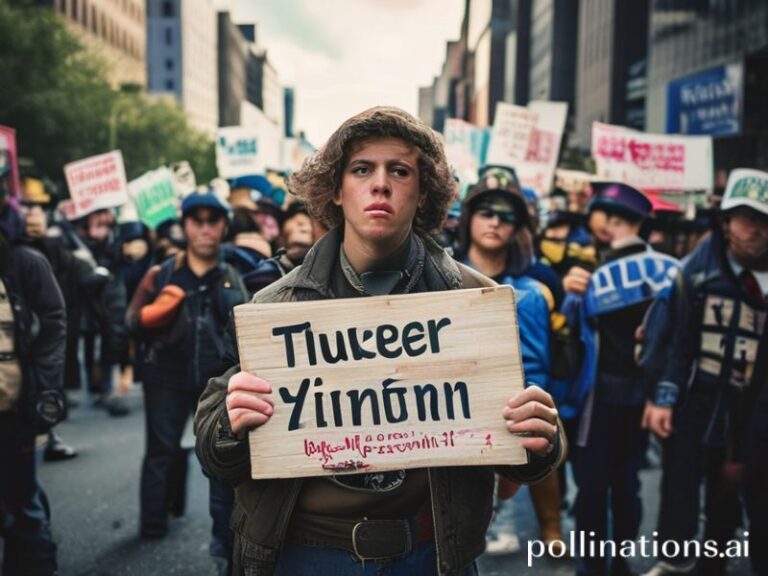America Ferrera: The Soft-Power Superpower Nobody Sanctioned
America Ferrera: The Accidental Geopolitical Weapon Washington Never Budgeted For
By Our Correspondent Still Recovering from the Barbie Press Tour
If you squint at the 2024 global balance-of-power spreadsheet long enough, you’ll notice a new line item wedged between semiconductor export bans and Taylor Swift’s carbon footprint: America Ferrera. Yes, the same actress who once taught us how to wear a retainer with dignity in “Real Women Have Curves” is now being weaponised—diplomatically, economically, existentially—by every hemisphere that owns a streaming subscription.
Start in Latin America, where her Honduran roots and Stateside stardom have turned her into a one-woman soft-power franchise. When the U.S. Embassy in Tegucigalpa wants to distract from another DEA extradition scandal, they roll out a Ferrera Q&A on “authentic representation” faster than you can say “structural adjustment programme.” Meanwhile, Mexican cineastes claim her as proof that the Golden Age of Mexican cinema never ended; it simply moved to Burbank and got better dental. Across the Atlantic, the French—who normally require three philosophers and a strike before acknowledging any foreign culture—have granted her an unofficial Légion d’honneur for services to intersectional eyerolls.
Asia’s uptake has been more transactional. South Korea’s CJ Entertainment licensed “Ugly Betty” formats, swapped the braces for K-pop glow-ups, and exported the result back to Netflix, thus completing the rare pop-culture ouroboros: a US remake of a Colombian telenovela repurposed by Seoul, re-devoured by Los Angeles, and binge-watched in Bogotá at 1.5x speed. Analysts at Singapore’s Ministry of Trade quietly credit the Ferrera Cinematic Universe with a 0.3 % bump in regional ad-spend—small numbers, unless you’re trying to convince a sovereign wealth fund that feelings are an asset class.
Then there’s the Barbie Industrial Complex. Greta Gerwig’s pink-washed fever dream minted $1.4 billion, but its aftershocks were geopolitical. Ferrera’s viral monologue—equal parts TED Talk and primal scream—was clipped, subtitled, and weaponised by protest movements from Lagos to Lahore. Iranian women spliced it into protest reels; Polish feminists projected it onto the side of the Education Ministry; even the Swiss, who usually prefer neutrality and chocolate, circulated the clip with the caption “This, but banking.” The monologue became a global Rorschach test: proof of American self-absorption or a universal howl against late-stage capitalism—sometimes both in the same group chat.
Of course, every empire needs its accountants. UNESCO just published a white paper quantifying the “Ferrera Effect”: a measurable uptick in STEM enrolment among Latina teenagers in twelve countries, attributed to her role as a NASA engineer in “The Dry Land” (a film nobody remembers except, apparently, every guidance counsellor south of the Rio Grande). The World Bank is less euphoric; its economists worry that exporting aspirational Latinx narratives might raise expectations above what current labour markets can metabolise. Translation: if too many girls believe they can build Mars rovers, who will pick the strawberries?
Back home, Hollywood is trying to reverse-engineer the phenomenon. Studio execs—fresh from panic-googling “intersectionality” between green-light meetings—have green-lit three Ferrera-adjacent vehicles about plucky immigrants teaching robots to unionise. Each project promises “global resonance” while quietly banking on tax credits from whichever nation hasn’t yet discovered irony.
And yet the woman herself remains almost maddeningly grounded. When asked at the Berlin Film Festival whether she considers herself a geopolitical actor, she laughed so hard she nearly spilled her Club-Mate. “I’m just trying to get my kids to eat vegetables,” she said, inadvertently summarising the entire liberal-international order: noble intentions, messy execution, someone still has to bribe a toddler with ketchup.
Conclusion: In an era when superpowers measure influence in hypersonic missiles and microchip sanctions, America Ferrera has achieved the rare feat of weaponising empathy—cheap to produce, impossible to intercept, and wildly inflation-proof. Call it soft power, call it soft soap, call it whatever gets you through the quarterly earnings call. Just don’t call it accidental. In a world running dangerously low on relatable icons, her face—equal parts resolve and exasperation—may be the most cost-effective foreign-policy tool Washington never meant to invent. And if that doesn’t terrify you, congratulations: you’re probably already on the algorithmic watchlist.







